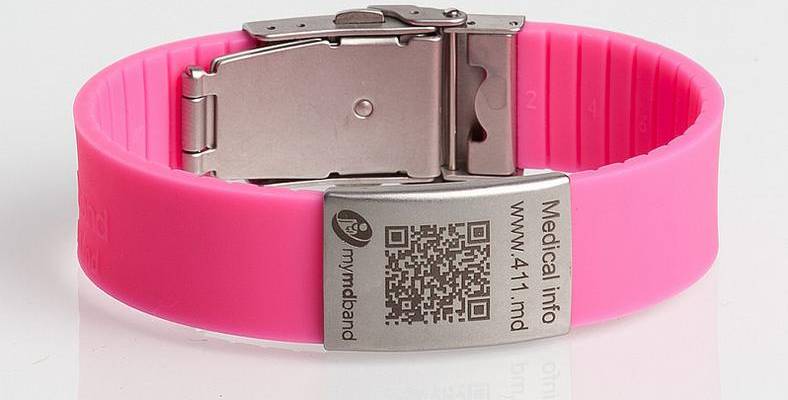MyMDband solves a critical problem for first-responders, providing immediate access to a patient’s medical information at the time of an emergency.
When Elly Gorodetzer’s mother fell off an escalator in the mall, first responders noticed the MyMDband on her wrist and scanned its QR code to access her medical profile, at the same time automatically alerting her loved ones of the incident’s location.
No doubt she’s grateful to her son Elly and grandson Gidon for inventing MyMDband in the first place.
“We assembled a team of medical professionals, technology experts and patients to come up with a solution to one of the most critical problems in emergency medicine: Lack of access to a patient’s medical information,” explains Gidon Rogers, a computer professional and a volunteer medic for Israel’s Magen David Adom first-response network.
MyMDband recently went on the market in eight countries. The waterproof, maintenance-free, lifetime-guaranteed silicon band with a laser-engraved QR code on a stainless-steel buckle displays all the data needed immediately after it’s scanned: prior medical conditions, current medications, allergies, vaccinations; even the patient’s last EKG.
The patent-pending device has multilingual capability, automatically displaying the data in the language of the caregiver — an especially useful feature for world travelers.
“It’s a nightmare to receive medical care in foreign countries because of the lack of a common language,” says Rogers. “The band is the interface between you and the caregiver. It recognizes the language of the machine that scanned it, and the location. Based on that, we can adapt the information,” including generic names of medications not otherwise recognizable to foreign health providers.
Rogers says he and his uncle-cofounder think MyMDbands could have been helpful for the hundreds of young Israeli backpackers caught in the Nepal earthquake. In fact, one of the Israelis who helped refine and promote the technology is Dov Maisel, a United Hatzalah paramedic who flew to Nepal with Israeli innovations including the Pocket BVM, a collapsible resuscitator he helped invent.
New twist on medic-alert products
MyMDband puts a sophisticated new twist on an old, low-tech product.
“Medical alert bracelets have been around for 50 years and haven’t really evolved; they provide very limited information,” Rogers tells ISRAEL21c.
“Ours have everything you need to know in the ambulance or emergency room. And when the QR code is scanned, we automatically notify your emergency contacts and use the phone’s GPS to tell them where you’re located.”
The product evolved from Rogers’ and Gorodetzer’s MyMDfile, a centralized electronic medical file system that simplifies the process of getting second opinions. They developed MyMDfile about 12 years ago and donated it to Israel Prize laureate Rabbi Elimelech Firer, whose Ezra Le’Marpeh organization provides free consultations for Israeli patients with medical experts around the world.
“MyMDband uses the same sophisticated system to provide the most critical information at a time of emergency wherever you are, when you don’t need your entire history. There are many solutions out there for storing or retrieving medical information, but they don’t take into consideration actual needs in the field,” says Rogers.
“As a volunteer medic, I see the need for this solution all the time. Even conscious patients sometimes have trouble communicating effectively and it can be life-threatening if I don’t know their existing medical conditions or allergies. So here all the information is accessible in seconds.”
They designed it for the wrist for the simple reason that it’s visible during the routine blood pressure and pulse check. The basic band is black; an optional Style Pack contains different colored bands.
MyMDband users pay $65 for a one-year subscription. Rogers explains that it’s structured this way to enable ongoing updates to the multilingual auto-display feature. “We keep adding medication lists of different countries and different languages.” For now, the feature works in English, French, Spanish, Russian, Hebrew, German and Arabic.
MyMDbands for Holocaust survivors
The makers of MyMDband have launched two campaigns, one to get their product into the marketplace and the other to get the band onto the wrists of Israel’s Holocaust survivors.
These campaigns are the first to use the new Crowdmii (Crowd Made in Israel) crowdfunding platform that seeks to connect Israel supporters from around the world with Israeli startups selected for their potential to improve lives.
The commercial campaign gives supporters several ways to purchase the bracelets while providing funds for MyMDbands to expand its repertoire of languages and its reach.
The second campaign allows supporters to provide MyMDbands to elderly survivors through United Hatzalah’s “Ten Kavod” (“Give Respect”) project, which sends medics on regular home visits to the lone elderly, with particular focus on Israel’s 193,000 Holocaust survivors, many of whom suffer from multiple medical conditions.
“You will not get the product at the end of the campaign, but a Holocaust survivor will receive it on your behalf,” Crowdmii CEO Assaf Luxembourg tells ISRAEL21c. “We want to enable Israel supporters to give them this lifesaving product as a show of compassion and care.”
Luxembourg says Crowdmii chose MyMDband as its first venture “since we truly believe they represent an important mission and a vision that people who support Israel would want to be a part of. This is what we believe the phrase ‘A light unto the nations’ should refer to.”
MyMDband is available in eight countries including the US, Canada, UK and Australia; distributors are being sought in other countries.
For more information, click here.
By: Abigail Klein Leichman. www.israel21c.org
Click here for the latest Good News from Israel.
